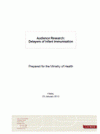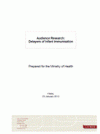In November 2011, the new immunisation health target seeking to improve immunisation timeliness of young infants was introduced. The target is 95 percent of all eight-month-olds are fully immunised with three scheduled vaccinations at six weeks, three months and five months by December 2014. To achieve this goal it is important to understand the reasons some parents delay their childs immunisation and messages that will encourage and support parents to immunise their infants on time.
The Ministry of Health commissioned qualitative audience research focusing on parents who have delayed one or more of their baby or young infant’s primary immunisations.
The findings will be used to develop cost-effective strategies that will futher make a difference to New Zealand immunisation rates and the health of New Zealand children and communities.
Purpose
The research objectives were to explore parents’ decisions and reasons for delaying any or the entire primary immunisations, with a focus on the following factors:
- motivations and enablers for parents to immunise their infants, on time, as scheduled
- barriers to parents immunising their infants on time
- the role of individual factors when immunisation is delayed
- the role of family/whānau and others when immunisation is delayed
- the role of environmental factors (such as access to transport, health services) when immunisation is delayed
- key messages that might encourage or enable timely immunisation uptake amongst parents of infants.
Methodology
The research was conducted in two phases.
- Exploratory research, which looked at factors that result in delayed immunisation in the primary series, key motivations, enablers and barriers, and the role of the individual, family/whānau and environmental factors in the delay.
- Message testing, which explored a range of messages designed to encourage and support parents to immunise their infants on time.
Fieldwork was conducted between July and August 2012. The following activities were completed for both stages of the research:
- development of research tools such as recruitment specifications, interview guides, participant information sheets and consent forms
- recruitment of parents from target groups – purposive methods, such as community networks, recruitment through early childhood centres, were used
- informed consent processes were followed, and focus groups and interviews were audio recorded with parents’ permission
- two-hour focus groups were conducted in qualitative research rooms and in local community rooms, involving four to six people
- one hour individual interviews were conducted in participants’ homes
- parents received a $60 koha in recognition of their time and contribution to the research.
Sample
The research was conducted with parents of infants aged eight to 12 months for whom one or more primary immunisation events were delayed for at least four weeks from the scheduled age. The recruitment had a particular focus on Māori and Pacific parents and those from low income households. Participants were recruited from seven District Health Board areas (Northland, Counties Manukau, Waitemata, Waikato, Bay of Plenty, Capital and Coast, and Canterbury). Fieldwork was mainly undertaken with mothers, given their primary role in looking after infants of this age. Participants were grouped by ethnicity for focus groups in the first stage, and by reason for delaying immunisation in the second stage.
Key Results
The research concluded that:
- parents who have delayed one of more of their babies’ primary immunisation events have a strong desire to protect them from serious illness and disease and keep them healthy and well throughout their lives. The tipping point for immunising their babies and children is around socialisation
- parents are aware of the recommended ages for immunising their babies, but they have little or no understanding of the importance of immunising their baby at the recommended ages or the consequences of not doing so on time
- parents believe they had legitimate reasons for delaying their babies’ immunisations (eg, their babies were unwell, or they lacked transport to get to appointments). Parents are more comfortable delaying their babies’ immunisations in cases where they believe their reasons for delaying are in the best interest of their babies (eg, in cases of unwell or premature babies). However, parents often feel guilty for delaying their babies’ immunisations where reasons are circumstantial (eg, not having transport)
- role of family/whānau and others when immunisation is delayed
- immunisation is a significant event and most mothers are usually supported by their partner or another female family member when their babies are being immunised
- these mothers find this support extremely valuable
- environmental factors, such as access and cost of transportation to get to health services have a significant role in timeliness of immunisation for low-income families while most parents find immunising their babies in a clinical setting comforting, in case of reactions to the vaccines, most do not find it suitable comforting their babies in public waiting areas.


